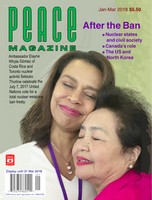
Peace Magazine Jan-Mar 2018, page 29. Some rights reserved.
Search for other articles by Will C. van den Hoonaard (reviewer) here
By Payam Akhavan. Toronto: House of Anansi Press, 2017.
This book teaches us the stages of growing international law in dealing with war atrocities. We also learn that one cannot disavow one’s feelings about human suffering from the prosecution of war criminals. Payam Akhavan, its author (the 2017 CBC Massey Lecturer), illumines a path toward justice and human rights.
He tells us of a 17-year old Bahá’í in Iran who was tortured and executed for teaching Bahá’í children’s classes. This was Mona, who steadfastly faced her torturers and comforted her executioner—who was overcome with grief over the task of hanging her. Nowadays, thousands of parents beyond the confines of Iran and Ayatollah’s regime name their daughter after that girl.
The horrors of Iran’s revolution, Akhavan writes, “made me desperate to understand why the lives of our loved ones had been extinguished, why their tormentors couldn’t be brought to justice, [and] why the UN didn’t stop this from happening.”
Chapter Two, “The Pursuit of Global Justice,” tells of a defendant—a Serbo-Croatian war criminal who profusely shed tears over the loss of his family. As an international human rights lawyer, Akhavan sees human suffering while engaging in legal rituals on “prestigious panels at five-star hotels” far from the grim realities of atrocities. The chapter describes the captures and trials of such war criminals as Erdemovic, Karadžic, Mladic, and Miloševic.
Chapter Three takes us to the 1994 Rwandan massacre, after which Akhavan helped set up the International Criminal Tribunal for Rwanda. He asks: Why is there no will to intervene by those who have the means?” Hutu rebels murdered the prime minister, who was planning to urge calm, and the Belgian UN peacekeepers protecting them. To General Dallaire’s dismay, his appeal to the UN for more forces went unheeded. Murderous mobs had a free rein. Security Resolution 912 abandoned Rwanda to its fate. Akhavan tells us that “the catastrophic failure of political will” and the callous indifference to the plight of victims was “sanitized” as an adjustment in the UN’s mandate. The Rwandan events testified to the world’s betrayal. Instead of protecting the Tutsis, the UN force pulled out, leaving them to unimaginable horrors at the hands of the Hutus following close behind with machetes.
The disaster in Rwanda, however, proved to be a juncture when the UN initiated a new concept,“peace enforcement” in the Democratic Republic of Congo when fighting the militia. This is a glimmer of hope in the fight against potential genocide or war crimes. Akhavan recounts other cases where bystanders see victims as the perpetrators of their own misery.
Chapter Four adumbrates the concept of the oneness of humanity and offers a substantial critique of the idea of “the clash of civilizations.” This notion has an evocative, albeit unrealistic power. It depicts human tragedy as surrender to an uncontrollable cultural force. It potentially cues us to invent enemies and their destruction. “The splendid isolation of Western civilization “ according to Akhavan, “from the savagery on its fringes allowed for a comfortable and secure existence.” We all belong to a single emerging world civilization with both the disrupture of the old and the rise of the new.
Chapter Five, “The Sprit of Human Rights” asks: “In pursuit of a virtuous self-image, how does the ‘civilized’ world of Western liberalism perceive the sufferings of others at its periphery?” In our search for transcendence, Akhavan proclaims, “we have embraced human rights as the secular sacred.” Moral relativism and cultural diversity are the nodes upon which rests our notion of human rights. What options are we left with? Is our species incorrigibly selfish and aggressive, or does it have a noble essence? Do we give in to materialism and consumerism, or to altruism.
I won’t spoil the plot of In Search of a Better World. Sally Armstrong, noted international journalist, speaking at St. Thomas University (Fredericton) described the profound experience of traveling with Payam Akhavan. She came to recognize empathy as crucial to the international institutions capable of maintaining peace.
I was deeply touched by the book. Akhavan and I are both members of the Bahá’í Faith, which celebrates the oneness of humanity.
Reviewed by Will C. van den Hoonaard, Professor Emeritus of Sociology, University of New Brunswick, Fredericton.

Peace Magazine Jan-Mar 2018, page 29. Some rights reserved.
Search for other articles by Will C. van den Hoonaard (reviewer) here